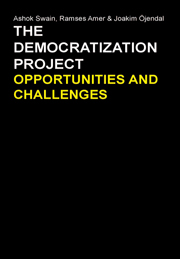Book contents
- Frontmatter
- Contents
- List of Tables
- List of Figures
- Acknowledgements
- Contributors
- The Democratization Project: Opportunities and Challenges
- 1 The Democratization Project: Peace, Conflict and Development
- 2 Non-Authorized Military Interventions and Legitimization by the United Nations
- 3 From Condemnation to Legitimization of Outcome: The United Nations and the Use of Force in Inter-State Relations
- 4 Demos or Deus: Patterns of Religious Dimensions in Asian Armed Conflicts, 1945–2005
- 5 The Left and Democratic Consolidation – Deepening Democracy in Latin America?
- 6 Democracy without People? – The Risk of Monopolizing the Democratization Project
- 7 The Role of Hamas in Building Palestinian Democracy in the Midst of Violence
- 8 Elections and Violence in Sri Lanka: Understanding Variation Across Three Parliamentary Elections
- 9 Post-Accord Elections and Armed Conflict
- 10 Peace Through Democracy? The Challenges of Postwar Democratization in Weak and War-Torn States
4 - Demos or Deus: Patterns of Religious Dimensions in Asian Armed Conflicts, 1945–2005
Published online by Cambridge University Press: 05 March 2012
- Frontmatter
- Contents
- List of Tables
- List of Figures
- Acknowledgements
- Contributors
- The Democratization Project: Opportunities and Challenges
- 1 The Democratization Project: Peace, Conflict and Development
- 2 Non-Authorized Military Interventions and Legitimization by the United Nations
- 3 From Condemnation to Legitimization of Outcome: The United Nations and the Use of Force in Inter-State Relations
- 4 Demos or Deus: Patterns of Religious Dimensions in Asian Armed Conflicts, 1945–2005
- 5 The Left and Democratic Consolidation – Deepening Democracy in Latin America?
- 6 Democracy without People? – The Risk of Monopolizing the Democratization Project
- 7 The Role of Hamas in Building Palestinian Democracy in the Midst of Violence
- 8 Elections and Violence in Sri Lanka: Understanding Variation Across Three Parliamentary Elections
- 9 Post-Accord Elections and Armed Conflict
- 10 Peace Through Democracy? The Challenges of Postwar Democratization in Weak and War-Torn States
Summary
Introduction
Religion has become one of the most important focal points in the contemporary debate on democracy, democratization and conflict. The new consensus is that the project of transforming states and societies, and of spreading democratic culture and institutions–the democratization project– cannot circumvent a phenomenon taking place in the global South: the rise of religious politics and violence. Understanding how religious factors affect politics and conflict has become a prerequisite to understanding how peace and stability can endure in the global South.
Yet, we still lack the overall picture of how religious dynamics play out in violent conflicts, particularly in non-Western societies. A set of crucial questions is therefore left unanswered. What are the religious dimensions of armed conflicts? What kinds of issues are at stake in religious tensions? Are religious conflicts becoming more, or less, common? Are some religions more conflict prone than others? How has the landscape of armed conflicts changed over the decades?
This chapter sets out to find answers to these questions by exploring the religious patterns of armed conflicts in Asia, during the time period 1946–2005. The Asian region is an important part of the global South, and therefore a crucial region to study if we seek guidance for how the religious dynamics affect developing countries. In addition, this regional focus fills an important lacuna in previous research on religion and conflict.
- Type
- Chapter
- Information
- The Democratization ProjectOpportunities and Challenges, pp. 67 - 86Publisher: Anthem PressPrint publication year: 2009



